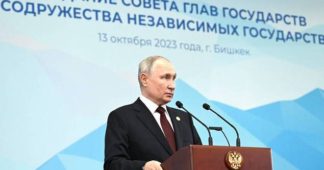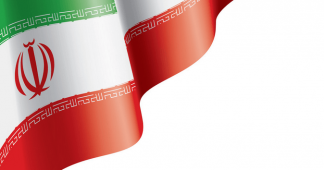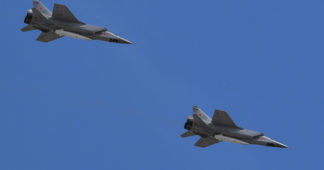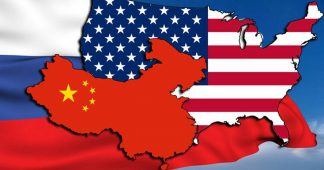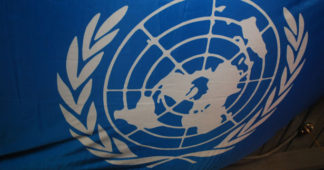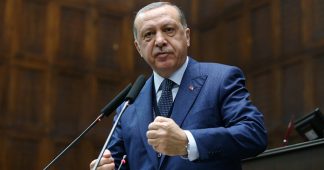Beijing’s vague language on the conflict is effectively undermining the Palestinian position
By Razan Shawamreh
4 November 2023
Israel’s war on the Gaza Strip and its 2.3 million Palestinians has ushered in a new era of great-power political wrangling, with China and Russia on one side and the US on the other. They have wasted no time in taking shots at each other.
Israel and the US have expressed their “disappointment” with China’s ambiguous position and failure to condemn Hamas. The US ambassador to China has urged Chinese President Xi Jinping to denounce Hamas, after Washington reiterated its ironclad support for Israel.
Rafi Harpaz, a diplomat in Israel’s foreign ministry, also expressed “deep disappointment” with China’s position, noting that the messages coming from Beijing had “no clear and unambiguous condemnation of the terrible attack and heinous massacre committed by the terrorist organisation Hamas against innocent civilians and the abduction of dozens of them to Gaza”.
China’s initial reaction to the conflict noted that the flare-up was evidence that “the protracted standstill of the peace process cannot go on”, with a foreign ministry spokesperson adding: “The fundamental way out of the conflict lies in implementing the two-state solution and establishing an independent state of Palestine.”
This is in line with China’s long-standing posture on the Israel-Palestine conflict, and it’s highly unlikely to change now, for several reasons.
Firstly, China differs from the West in its approach to the international order. It often criticises western alliances, considering them a destabilising factor in the global system.
Secondly, Palestine is not Russia, despite US President Joe Biden’s attempt to equate Hamas with Russian President Vladimir Putin in asserting that “both want to completely annihilate a neighbouring democracy”. The conflicts in Ukraine and Palestine have bolstered western alliances, while subjecting China, which aims to challenge western dominance, to a substantial test.
‘Fuel to the fire’
China has refused to condemn Russia’s war on Ukraine, while accusing Washington and Nato of being stuck in a Cold War mentality. Beijing has also accused Washington of “adding fuel to the fire” by providing military support to Ukraine.
Yet, while the same anti-Russia international alliance is also backing Israel in the current Middle East conflict, China has not deployed the same rhetoric. Its only criticism thus far has been China’s assertion that it was “deeply disappointed at the US blocking” a Security Council resolution condemning all violence against civilians in the Israel-Palestine war.
Thirdly, China does not engage unilaterally or assume responsibility for resolving international conflicts. Its statements consistently emphasise supporting international efforts and encouraging a more effective role for the global community. On the Gaza war, Beijing has urged the international community “to act with greater urgency, step up input into the Palestinian question… and find a way to bring about enduring peace”, while also emphasising the UN’s obligation to act.
Fourthly, China’s rhetoric of “neutrality” involves equally condemning both sides. “Violence for violence will only lead to a vicious cycle,” the foreign ministry noted of the Gaza war. “What’s most imperative is to stop fighting and end hostilities immediately.”
Chinese foreign ministry spokesperson Mao Ning has condemned any acts that harm civilians or “moves that escalate the conflict and destabilise the region”. China did not explicitly name Hamas in this condemnation, nor did it take a stance on who was responsible for the al-Ahli hospital massacre, noting in a statement that China “strongly condemns the attack on the hospital in Gaza, which has caused massive casualties”, while calling “for an immediate ceasefire and cessation of hostilities”.
Serious consequences
This “neutrality” in condemnation has serious consequences for Palestinians. Instead of offering support, it effectively undermines their position by suggesting an equivalence between the aggressive actions by Palestinian fighters and the disproportionate response by the Israeli army.
In this context, China must remember Dante’s eloquent warning that “the darkest places of hell are reserved for those who maintain their neutrality in times of moral crisis”.
The final consideration is what could be termed as China’s biased impartiality in the Palestinian-Israeli conflict. While China heralds its neutrality in the conflict, the facts on the ground suggest Chinese support for Israel.
China has consistently deviated from international norms on the conflict’s pivotal issues, including through its support of the “Jewishness” of the state of Israel; its investments in Israeli settlements and reinforcement of economic security for settlers in the occupied West Bank and East Jerusalem; and its promotion of Arab normalisation with Israel, despite the adverse impacts on the Palestinian population.
For decades, China’s stance on the Israel-Palestine conflict has undergone a gradual transformation, moving ever closer towards the Israeli state. Its current position indicates that it will not revisit the era of Mao Zedong, who once described Israel as a “base of imperialism” in China. While China should not revert to this historical stance, at a minimum it should stop reinforcing the Zionist narrative.
We remind our readers that publication of articles on our site does not mean that we agree with what is written. Our policy is to publish anything which we consider of interest, so as to assist our readers in forming their opinions. Sometimes we even publish articles with which we totally disagree, since we believe it is important for our readers to be informed on as wide a spectrum of views as possible.
